Fleurs du Mal Magazine


Or see the index

Sometimes In The Middle Autumn Days
Sometimes in the middle autumn days,
The windless days when the swallows have flown,
And the sere elms brood in the mist,
Each tree a being, rapt, alone,
I know, not as in barren thought,
But wordlessly, as the bones know,
What quenching of my brain, what numbness,
Wait in the dark grave where I go.
And I see the people thronging the street,
The death-marked people, they and I
Goalless, rootless, like leaves drifting,
Blind to the earth and to the sky;
Nothing believing, nothing loving,
Not in joy nor in pain, not heeding the stream
Of precious life that flows within us,
But fighting, toiling as in a dream.
O you who pass, halt and remember
What tyrant holds your life in bond;
Remember the fixed, reprieveless hour,
The crushing stroke, the dark beyond.
And let us now, as men condemned,
In peace and thrift of time stand still
To learn our world while yet we may,
And shape our souls, however ill;
And we will live, hand, eye and brain,
Piously, outwardly, ever-aware,
Till all our hours burn clear and brave
Like candle flames in windless air;
So shall we in the rout of life
Some thought, some faith, some meaning save,
And speak it once before we go
In silence to the silent grave.
George Orwell
(1903 – 1950)
Sometimes In The Middle Autumn Days
First published by The Adelphi, March 1933
• fleursdumal.nl magazine
More in: 4SEASONS#Autumn, Archive O-P, Archive O-P, George Orwell, Orwell, George
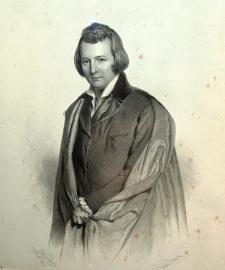
Deutschland.
Ein Wintermärchen
Im traurigen Monat November war’s,
Die Tage wurden trüber,
Der Wind riß von den Bäumen das Laub,
Da reist ich nach Deutschland hinüber.
Und als ich an die Grenze kam,
Da fühlt ich ein stärkeres Klopfen
In meiner Brust, ich glaube sogar
Die Augen begunnen zu tropfen.
Und als ich die deutsche Sprache vernahm,
Da ward mir seltsam zumute;
Ich meinte nicht anders, als ob das Herz
Recht angenehm verblute.
Ein kleines Harfenmädchen sang.
Sie sang mit wahrem Gefühle
Und falscher Stimme, doch ward ich sehr
Gerühret von ihrem Spiele.
Sie sang von Liebe und Liebesgram,
Aufopfrung und Wiederfinden
Dort oben, in jener besseren Welt,
Wo alle Leiden schwinden.
Sie sang vom irdischen Jammertal,
Von Freuden, die bald zerronnen,
Vom Jenseits, wo die Seele schwelgt
Verklärt in ew’gen Wonnen.
Sie sang das alte Entsagungslied,
Das Eiapopeia vom Himmel,
Womit man einlullt, wenn es greint,
Das Volk, den großen Lümmel.
Ich kenne die Weise, ich kenne den Text,
Ich kenn auch die Herren Verfasser;
Ich weiß, sie tranken heimlich Wein
Und predigten öffentlich Wasser.
Ein neues Lied, ein besseres Lied,
O Freunde, will ich euch dichten!
Wir wollen hier auf Erden schon
Das Himmelreich errichten.
Wir wollen auf Erden glücklich sein,
Und wollen nicht mehr darben;
Verschlemmen soll nicht der faule Bauch,
Was fleißige Hände erwarben.
Es wächst hienieden Brot genug
Für alle Menschenkinder,
Auch Rosen und Myrten, Schönheit und Lust,
Und Zuckererbsen nicht minder.
Ja, Zuckererbsen für jedermann,
Sobald die Schoten platzen!
Den Himmel überlassen wir
Den Engeln und den Spatzen.
Und wachsen uns Flügel nach dem Tod,
So wollen wir euch besuchen
Dort oben, und wir, wir essen mit euch
Die seligsten Torten und Kuchen.
Ein neues Lied, ein besseres Lied!
Es klingt wie Flöten und Geigen!
Das Miserere ist vorbei,
Die Sterbeglocken schweigen.
Die Jungfer Europa ist verlobt
Mit dem schönen Geniusse
Der Freiheit, sie liegen einander im Arm,
Sie schwelgen im ersten Kusse.
Und fehlt der Pfaffensegen dabei,
Die Ehe wird gültig nicht minder –
Es lebe Bräutigam und Braut,
Und ihre zukünftigen Kinder!
Ein Hochzeitkarmen ist mein Lied,
Das bessere, das neue!
In meiner Seele gehen auf
Die Sterne der höchsten Weihe –
Begeisterte Sterne, sie lodern wild,
Zerfließen in Flammenbächen –
Ich fühle mich wunderbar erstarkt,
Ich könnte Eichen zerbrechen!
Seit ich auf deutsche Erde trat,
Durchströmen mich Zaubersäfte –
Der Riese hat wieder die Mutter berührt,
Und es wuchsen ihm neu die Kräfte.
Heinrich Heine
(1797-1856)
Deutschland. Ein Wintermärchen
• fleursdumal.nl magazine
More in: 4SEASONS#Winter, Archive G-H, Archive G-H, Heine, Heinrich
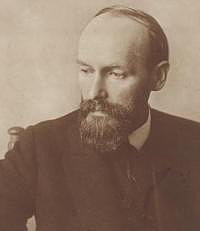
Der Rabe Ralf
Der Rabe Ralf
will will hu hu
dem niemand half
still still du du
half sich allein
am Rabenstein
will will still still
hu hu
Die Nebelfrau
will will hu hu
nimmt’s nicht genau
still still du du
sie sagt nimm nimm
‘s ist nicht so schlimm
will will still still
hu hu
Doch als ein Jahr
will will hu hu
vergangen war
still still du du
da lag im Rot
der Rabe tot ,
will will still still
du du
Christian Morgenstern
(1871-1914)
Der Rabe Ralf
• fleursdumal.nl magazine
More in: Archive M-N, Archive M-N, Christian Morgenstern, Department of Ravens & Crows, Morgenstern, Christian
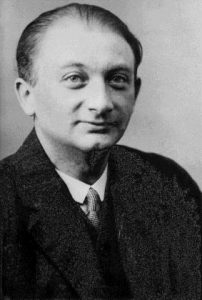
Natur
Hinter den Häusern der Stadt, dort wo die Verbotstafeln
stehn,
beginnt Gottes freie Natur, die den Menschen gehört.
Parzelliert und in Grundbüchern eingetragen sind
die Quellen, die Äcker, die Wälder, der Wind,
die Tannen, die Eichen, die Buchen, die Linden,
die Hasen, die Hirsche, der Lerchenschlag,
der Mond in den Nächten, die Sonne am Achtstundentag
und die Vögel, die, von Sorgen angeblich unbeschwert,
die segensreiche Ordnung dieser Welt verkünden – –
Leibeigene Eichkätzchen springen auf Eichen,
als wären sie unabhängig vom Kapital – –
und wissen nicht, daß unterdessen Förster ohne Zahl
auf hinterlistigen Pfaden zum Schießen schleichen – –
Nur die Schriftsteller wandern umher und werden Wunder
gewahr
und schreiben Gedichte, Skizzen und Romane,
sie leben in ihrem göttlichen Wahne
und sterben vom menschlichen Honorar.
Joseph Roth
(1894 – 1939)
Natur
Lachen links – 1. 2. 1924
• fleursdumal.nl magazine
More in: Archive Q-R, Archive Q-R, Joseph Roth, MUSEUM OF NATURAL HISTORY - department of ravens & crows, birds of prey, riding a zebra, spring, summer, autumn, winter

Summer-Like
Summer-like for an instant the autumn sun bursts out,
And the light through the turning elms is green and clear;
It slants down the path and ragged marigolds glow
Fiery again, last flames of the dying year.
A blue-tit darts with a flash of wings, to feed
Where the coconut hangs on the pear tree over the well;
He digs at the meat like a tiny pickaxe tapping
With his needle-sharp beak as he clings to the swinging shell.
Then he runs up the trunk, sure-footed and sleek like a mouse,
And perches to sun himself; all his body and brain
Exult in the sudden sunlight, gladly believing
That the cold is over and summer is here again.
But I see the umber clouds that drive for the sun,
And a sorrow no argument ever can make away
Goes through my heart as I think of the nearing winter,
And the transient light that gleams like the ghost of May;
And the bird unaware, blessing the summer eternal,
Joyfully labouring, proud in his strength, gay-plumed,
Unaware of the hawk and the snow and the frost-bound nights,
And of his death foredoomed.
George Orwell
(1903 – 1950)
Summer-Like
• fleursdumal.nl magazine
More in: 4SEASONS#Summer, Archive O-P, Archive O-P, George Orwell, Orwell, George
Born in New Zealand in 1934, Fleur Adcock spent the war years in England, returning with her family to New Zealand in 1947.
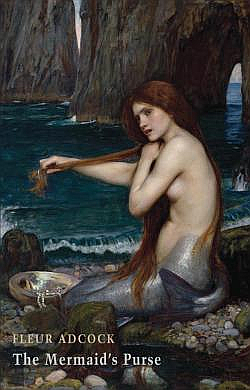 She emigrated to Britain in 1963, working as a librarian in London until 1979. In 1977-78 Fleur Adcock was writer-in-residence at Charlotte Mason College of Education, Ambleside.
She emigrated to Britain in 1963, working as a librarian in London until 1979. In 1977-78 Fleur Adcock was writer-in-residence at Charlotte Mason College of Education, Ambleside.
Fleur Adcock was Northern Arts Literary Fellow in 1979-81, living in Newcastle, becoming a freelance writer after her return to London.
She received an OBE in 1996, and the Queen’s Gold Medal for Poetry in 2006 for Poems 1960-2000 (Bloodaxe Books, 2000).
Fleur Adcock published three pamphlets with Bloodaxe: Below Loughrigg (1979), Hotspur (1986) and Meeting the Comet (1988), as well as her translations of medieval Latin lyrics, The Virgin & the Nightingale (1983).
She also published two translations of Romanian poets with Oxford University Press, Orient Express by Grete Tartler (1989) and Letters from Darkness by Daniela Crasnaru (1994).
All her other collections were published by Oxford University Press until they shut down their poetry list in 1999, after which Bloodaxe published her collected poems Poems 1960-2000 (2000), followed by Dragon Talk (2010), Glass Wings (2013), The Land Ballot (2015) and Hoard (2017).
The Mermaid’s Purse is due from Bloodaxe in 2021. Poems 1960-2000 and Hoard are Poetry Book Society Special Commendations while Glass Wings is a Poetry Book Society Recommendation. In October 2019 Fleur Adcock was presented with the New Zealand Prime Minister’s Award for Literary Achievement in Poetry 2019 by the Rt Hon Jacinda Ardern.
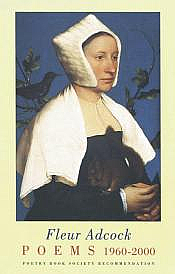 Fleur Adcock writes about men and women, childhood, identity, roots and rootlessness, memory and loss, animals and dreams, as well as our interactions with nature and place. Her poised, ironic poems are remarkable for their wry wit, conversational tone and psychological insight, unmasking the deceptions of love or unravelling family lives.
Fleur Adcock writes about men and women, childhood, identity, roots and rootlessness, memory and loss, animals and dreams, as well as our interactions with nature and place. Her poised, ironic poems are remarkable for their wry wit, conversational tone and psychological insight, unmasking the deceptions of love or unravelling family lives.
Fleur Adcock began writing the poems in this book when she was 82. The two chief settings are New Zealand, with its multi-coloured seas, and Britain, seen in various decades.
There are foreign travels, flirtations, family memories, deaths and conversations with the dead. Katherine Mansfield, incognito, dodges an academic conference; there’s a lesson in water divining as well as a rather unusual Christmas party.
We meet several varieties of small mammal, numerous birds, doomed or otherwise, and some sheep. The book ends with a sequence in memory of her friend, the poet Roy Fisher.
# new poetry
The Mermaid’s Purse
by Fleur Adcock
Publication Date : 25 Feb 2021
Pages: 80
Size: 234 x 156mm
ISBN: 9781780375700
Paperback
£10.99
• fleursdumal.nl magazine
More in: #Modern Poetry Archive, Archive A-B, Archive A-B, Mermaids
When Tamsin Calidas first arrives on a remote island in the Scottish Hebrides, it feels like coming home.
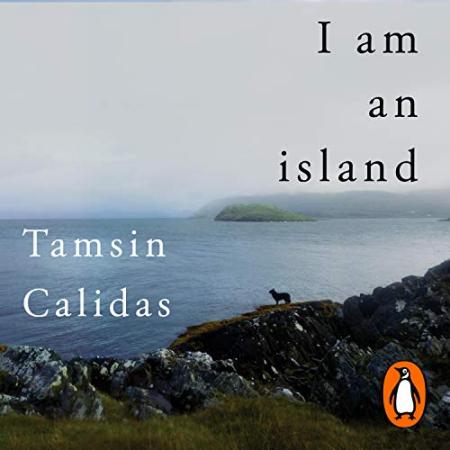
Disenchanted by London, she and her husband left the city and high-flying careers to move the 500 miles north, despite having absolutely no experience of crofting, or of island life. It was idyllic, for a while.
But as the months wear on, the children she’d longed for fail to materialise, and her marriage breaks down, Tamsin finds herself in ever-increasing isolation. Injured, ill, without money or friend she is pared right back, stripped to becoming simply a raw element of the often harsh landscape. But with that immersion in her surroundings comes the possibility of rebirth and renewal. Tamsin begins the slow journey back from the brink.
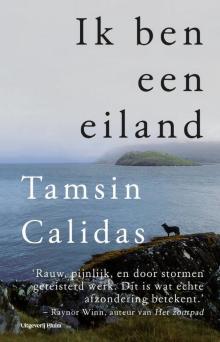 Startling, raw and extremely moving, I Am An Island is a story about the incredible ability of the natural world to provide when everything else has fallen away – a stunning book about solitude, friendship, resilience and self-discovery.
Startling, raw and extremely moving, I Am An Island is a story about the incredible ability of the natural world to provide when everything else has fallen away – a stunning book about solitude, friendship, resilience and self-discovery.
Tamsin Calidas is a writer and photographer living in the wilds of the Scottish Hebrides. She worked in London before giving it all up in 2004 to move to a tiny, remote island in Scotland to run a derelict croft with sheep and horses.
I Am An Island
by Tamsin Calidas
2020
Language: English
304 pages
ISBN-10: 0857526650
ISBN-13: 978-0857526656
Hardcover $23.25
Paperback $14.50
Ik ben een eiland
door Tamsin Calidas
Vertaling Hans Kloos
2021
Nederlands
ISBN 9789083095394
Uitgeverij Pluim
320 pagina’s
Paperback € 22,99
• fleursdumal.nl magazine
More in: - Book News, - Bookstores, Archive C-D, Natural history
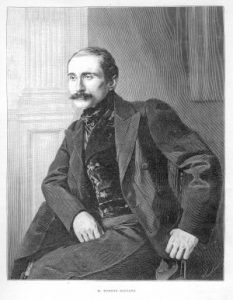
Fabre Des Insectes
I
Sachant que l’humble arpent d’un jardinet claustral
Contient plus de secrets qu’un mortel n’en pénètre,
Il vit seul comme un pâtre et pauvre comme un prêtre,
Et d’un grand feutre noir coiffé comme Mistral.
C’est un homme incliné, modeste et magistral,
Qui plus qu’un monde au loin cherche à ses pieds un être,
Et qui, ne regardant que ce qu’on peut connaître,
Préfère un carré d’herbe à tout le ciel astral.
Pensif, -car dans ses doigts il a tenu des ailes, –
Poursuivant les honneurs moins que les sauterelles,
-Les sommets rêvent-ils d’être des sommités? –
Il nous offre une vie égale aux fiers poèmes,
Et des livres qu’un jour il faudra que ceux mêmes
Feignent de découvrir, qui les ont imités.
II
Une vie admirable. Aucun homme n’a dû
Fréquenter de plus près la maternelle argile.
Son bosquet de lilas lui tient lieu d’Évangile.
D’un Fabre d’Eglantine il semble descendu.
Il guette tout un jour ce qu’il n’a qu’entendu
Il ne peut s’ennuyer, sachant par coeur Virgile.
S’il découvre un insecte éclatant et fragile,
Il lui donne le nom du fils qu’il a perdu.
Quand il rentre, le soir, avec sa découverte,
La Vérité peut-être est dans sa boîte verte,
Car du puits d’un insecte elle peut émerger.
Voilà sa vie. Elle est simple, triste, ravie.
Il n’enlève jamais son chapeau de berger.
Et ses livres se font tout seuls, avec sa vie.
Il a vu, du plus haut problème effleurant l’x,
Jusqu’où l’instinct triomphe et quand il capitule,
Et comment le papier, le coton et le tulle
Sont faits par la Psyché, la Guêpe et le Bombyx.
O peuple merveilleux de métal et d’onyx!
Le Grillon d’Italie est un petit Catulle.
Le Pompile attaquant tout seul la Tarentule
Est grand comme Roland ou Vercingétorix.
Tout l’univers est là… combattants, parasites…
L’un vit de ses exploits, l’autre de ses visites.
Il y a le maçon, le potier, le tailleur.
Tu ravaudes, Clotho; Balanin, tu perfores;
Bousier, tu suis ton nom; toi, Cigale, ton coeur;
Et vous, vous attendez, dans un coin, Nécrophores!
III
Les Insectes Lui Parlent.
«Et nous, nous nous chargeons de ton Apothéose.
Car nous fûmes toujours les amis les meilleurs.
Nous, Tes Insectes, ceux de Vaucluse et d’ailleurs,
Voulons tous dans ta gloire être pour quelque chose.
«La fourmilière sculpte, et la ruche compose.
Une étoile d’argent se tisse entre deux fleurs.
Tu sais que nous savons réussir des splendeurs.
Fabre, le souviens-tu de la chapelle rose?
«Te souviens-tu qu’un jour, en haut du mont Veutoux,
Tu vis un temple obscur et bâti loin de tous
Sur lequel nous étions cent mille coccinelles?
«La chapelle était rose et semblait en corail!
Ainsi, la solitude aura sur son travail
Une gloire vivante et faite avec des ailes.»
Edmond Rostand
(1868-1918)
Fabre Des Insectes
• fleursdumal.nl magazine
More in: Archive Q-R, Archive Q-R, MUSEUM OF NATURAL HISTORY - department of ravens & crows, birds of prey, riding a zebra, spring, summer, autumn, winter, Natural history

Perzische kievitsbloem
(Fritillaria persica)
Je blaadjes glanzen amper aarzelend klokvormig,
mauve en zacht als het velletje van een pruim.
Vochtig in de halfschaduw op een zwart grondje
bestond je in oude dromen reeds, elke lente steeds
de lampenkapjesbloemetjes vrolijk in het gelid.
Hommeltjes gebruiken ze blij als schommeltjes.
Bert Bevers
Perzische kievitsbloem
(Fritillaria persica)
• fleursdumal.nl magazine
More in: Archive A-B, Archive A-B, Bevers, Bert, Natural history
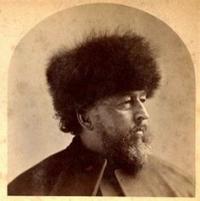
The Eagle Hunter
On the mighty summit, heaten
By the wintry sleet, I wander,
For I seek the monarch eagle
In his eyrie of the rock;
And I shout in fierce exulting,
When his gray wing on the darkness
Of the cloud above me flashes,
Wheeling downward to the shock!
Nearer, with his keen eye burning,
And his hungry beak extended —
With a shriek of anger swooping
Comes the storm-defying bird :
Yet as steady and unswerving,
Upward flies the fatal arrow,
And his death-cry on the sweeping
Of the sounding winds is heard!
From his wing I rob the plumage,
And it crowns me like a chieftain.
And his talons stud my girdle
Like the scales of olden mail;
Never wears the wild ranchero
Such a trophy on the vega,
Or the fiery-eyed Navajo,
In the Colorado’s vale!
Bayard Taylor
(1825 – 1878)
The Eagle Hunter
fleursdumal.nl magazine
More in: Archive S-T, Archive S-T, Department of Birds of Prey, Western Fiction
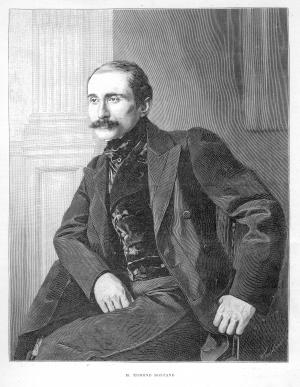
Le Petit Chat
C’est un petit chat noir effronté comme un page,
Je le laisse jouer sur ma table souvent.
Quelquefois il s’assied sans faire de tapage,
On dirait un joli pressepapier vivant.
Rien en lui, pas un poil de son velours ne bouge ;
Longtemps, il reste là, noir sur un feuillet blanc,
A ces minets tirant leur langue de drap rouge,
Qu’on fait pour essuyer les plumes, ressemblant.
Quand il s’amuse, il est extrêmement comique,
Pataud et gracieux, tel un ourson drôlet.
Souvent je m’accroupis pour suivre sa mimique
Quand on met devant lui la soucoupe de lait.
Tout d’abord de son nez délicat il le flaire,
La frôle, puis, à coups de langue très petits,
Il le happe ; et dès lors il est à son affaire
Et l’on entend, pendant qu’il boit, un clapotis.
Il boit, bougeant la queue et sans faire une pause,
Et ne relève enfin son joli museau plat
Que lorsqu’il a passé sa langue rêche et rose
Partout, bien proprement débarbouillé le plat.
Alors il se pourlèche un moment les moustaches,
Avec l’air étonné d’avoir déjà fini.
Et comme il s’aperçoit qu’il s’est fait quelques taches,
Il se lisse à nouveau, lustre son poil terni.
Ses yeux jaunes et bleus sont comme deux agates ;
Il les ferme à demi, parfois, en reniflant,
Se renverse, ayant pris son museau dans ses pattes,
Avec des airs de tigre étendu sur le flanc.
Edmond Rostand
(1868-1918)
Le Petit Chat
• fleursdumal.nl magazine
More in: Archive Q-R, Archive Q-R, Natural history

Summer Songs
I
How thick the grass,
How green the shade–
All for love
And lovers made.
Wood-lilies white
As hidden lace–
Open your bodice,
That’s their place.
See how the sun-god
Overpowers
The summer lying
Deep in flowers;
With burning kisses
Of bright gold
Fills her young womb
With joy untold;
And all the world
Is lad and lass,
A blue sky
And a couch of grass.
Summer is here–
let us drain
It all! it may
Not come again.
II
How the leaves thicken
On the boughs,
And the birds make
Their lyric vows.
O the beating, breaking
Heart of things,
The pulse and passion–
How it sings.
How it burns and flames
And showers,
Lusts and laughs, flowers
And deflowers.
III
Summer came,
Rose on rose;
Leaf on leaf,
Summer goes.
Summer came,
Song on song;
O summer had
A golden tongue.
Summer goes,
Sigh on sigh;
Not a rose
Sees him die.
Richard Le Gallienne
(1866 – 1947)
Summer Songs
From: The lonely Dancer and other Poems, 1913
•fleursdumal.nl magazine
More in: 4SEASONS#Summer, Archive G-H, Archive G-H, Gallienne, Richard Le
Thank you for reading Fleurs du Mal - magazine for art & literature